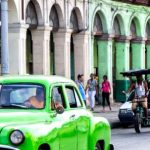“Food is the holiest thing in Earth; everything we eat contains the universe”
- 26 April 2017
World IP Day “Innovation makes life better”
Interview to Agustín Casalins, founder of Verde al Cubo, and client of Clarke, Modet & Co Argentina
“How can you achieve a positive impact on a billion people?” With that question in mind and an agro-ecological initiative in hand, Agustín Casalins traveled around Silicon Valley. He had been chosen to join Singularity University, the campus designed by NASA to favor innovative ideas that address the major challenges of humankind. Among these challenges, food was surely going to be one of the greatest problems our planet would have to face.
For many years, Agustín has been engaged in the production of hydroponic crops. This is how he became acquainted with the benefits of this production technique vis-à-vis traditional agriculture: greater efficiency, automation of a great part of the processes, the implementation of gravity-fed water irrigation, the no longer necessary use of agriculture machinery, fuels, agrochemicals, herbicides and pesticides, and, above all, the premium quality of the produce, introducing a cleaner, healthier and more nutritive option. He knew hydroponics would be our only option to produce abundance of food in a world to be the home to 10,000 people within a few decades.
What is hydroponics?
Hydroponics is a cultivation method whereby plants are placed on trays, on inorganic substrates, receiving nutrients through the supply of irrigation water. This yields an extremely healthy produce, containing all the minerals necessary for the proper functioning of our metabolism.
We can say this is a distinctive point, given that after two hundred years of traditional horticulture, the soil has been severely depleted. And, despite the addition of nitrogen, phosphorus and potassium, they lack selenium, molybdenum, manganese, copper, cobalt, all of which are the minerals we have always obtained from vegetables growing in fertile soils. Our body has been the most accurate representation of that nutrition for thousand for years, and the moment we stopped feeding with those minerals, all the metabolic reactions in our body resulting from feeding with those plants were halted. Soil demineralization results in poor immune systems likely to suffer infections such as colds, or conditions such stress.
Besides, this method is much more efficient than the others. While Corrientes, for instance, produces between 70,000 and 80,000 kg of tomato per hectare, with an indiscriminate use of pesticides, hydroponics produces 900,000 kg, i.e. 10 or 20 times more, making use of technology and offering a ecological quality produce, throughout the entire year.
When did you become interested in this technique?
My first experience dates back to when I was five years old. My father was a neurosurgeon at the Hospital Ferroviario, but he was also very keen on this topic. While the rest of the family was spending its holidays in Bariloche, he built his own rafts, and by the end of the holidays, the house had turned into a greenhouse: there were corn and tomato plants, to name a few, in the dining room, in the different rooms and even in the bathroom. That was the first time I realized about the power of science and technology applied to ecology.
By that time already, he foresaw that food production systems were not going to be enough in the future. I became acquainted with the technique through a book of his. Then, I went into the Agronomy School, I got my degree, I worked in other countries with livestock and dairy systems. Six years ago, I came back to Argentina, after having lived abroad for ten years, and I battled against adjusting to a system I considered “old”. That is why I founded Verde al cubo.
What is the idea behind Verde al cubo?
Verde al cubo is a hydroponics company offering urban systems of hydroponic crops in three different areas: home vegetable gardens, farmers and schools.
In collaboration with the Environmental Information Center and Education of the Ministry of Environment and Public Spaces of the City of Buenos Aires we have designed a Metropolitan Center of Urban Agriculture, offering high-tech production outdoor systems and greenhouses. Schools adhering to the green school plan are supplied with hydroponic greenhouses, where urban agriculture topics are addressed through workshops, input and supervision.
The concept we particularly care about these days as a company, and which has been the subject of our work, is Crowd Food, “food for crowds”. This concept entails the creation of a hydroponic farmers’ partnership where people can invest. The concept relates to the idea that if people invest in what they eat, they will become aware of what they buy and will start applying other quality standards.
Food is the holiest thing in Earth; everything we eat contains the universe: the air, the sun light that has traveled hundreds of millions of kilometers just to touch that leaf, the water drop that originated somewhere else and brought with it the mineral resulting from the melt, and all this turns into the food that keeps you alive. Something I have noticed, which pains me a great deal, is the carelessly way we handle food, that detachment from food vis-à-vis our own life, our own body. That is the sort of “philosophical” version of the company: we do not care about the idea of gaining certain hectares of production, we want to be the leaders of a social movement, with a thousand hectares, where people will invest in their food, and the produce is for and by the community.
What is the role of innovation in the project?
Something striking about hydroponics is that it has been applying the same formulae for twenty years; and the question was, why is it so? My expertise is in hydroponic vegetable nutrition, and on this basis, for instance, we have designed nutrients twenty times more concentrated which do not precipitate.
We registered our trademark with the help of Clarke, Modet & Co, and we currently keep on working with them in innovations that will enhance productivity. Thinking at patent-level helps you come up with new ideas. Our company is committed to feeding the entire world and we are working towards that.
– – –
This is no joke. Agustín is actually thinking about feeding the entire planet. His view, probably developed from his experience at Silicon Valley, looks towards a future that is closer than what it seems. “Nowadays anybody can make a difference in the world. In the past, you either had to be a Rockefeller, and well before that, you had to be a king. But these days, thanks to technology, we are all part of a global community. The conditions exist and the tools are available to achieve an impact on millions of people,” he claims. You only need to be clear about your purpose, and Agustín has made his mind.
Connect to our music








